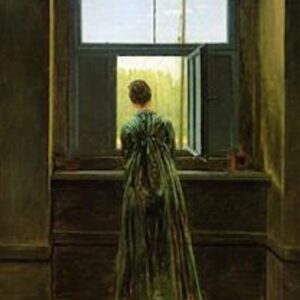My cat died in Germany once. In Cologne. I remember the city being very ugly and the famous cathedral being so black, completely covered in soot. I’m not against ugly cities and truth be told I rather enjoy them. Cities should be ugly. Of course, that’s an absurd thing to say. There’s nothing more lovely than a lovely city. I was reminded of this recently when I traveled from Berlin to Paris. Berlin is so ugly and Paris is so beautiful. Whatever doubts I might have had that Berlin is just really ugly, my father squashed them for me on a brief visit to the city while I was staying there. We were walking through the city, making our way from the Motel One he was staying at on Alexanderplatz to the little Airbnb where I was living in Prenzlauerberg with my old and assiduous friend Stevie and I was watching my father move ever so slowly through the not-so-interesting streets that connect the two neighborhoods and as we stopped at the second or third cafe for him to catch his breath and take a rest I realized that he is genuinely elderly now. It’s an indistinct threshold, being old. But he has become old. That is what happens, of course. There is no shame in it. Will Germany kill my father, just as it killed my cat, I wondered to myself. It was hot in Berlin that week. We should have taken the U-Bahn or even a cab. But I wanted to walk with my aging father through the streets of Berlin. I was feeling tenderly toward him, even though I, and simultaneously Berlin itself, were both trying to kill him.
“Why is this city so goddamn ugly?” my father asked me as we walked. He was barely moving, his feet shuffling through the incomprehensibly ugly neighborhood. Berlin streets are like quicksand for the elderly.
My cat did not actually die in Cologne. He just began to die there. He died after Shuffy and I reached Antwerp, which was our home at the time. The cat, Huck, started to genuinely die in Berlin and then we took a train to Cologne, where his condition worsened, and then we headed back to Antwerp, where he died. But I like to think it was Germany that killed him. When Huck died I couldn’t breathe for three days. I didn’t eat for six years. I renounced my left leg. At the time, I blamed Berlin. Since then, the blame has become a certainty. Berlin killed my cat. It is a city, furthermore, that will not rest until it has finally killed my father.
What really happened is that Europe itself died a long time ago. It destroyed itself, of course. It blew itself to smithereens. But then it also just kept going, because that’s what happens. Berlin is the capital of the true Europe, which is the destroyed thing that keeps going. Anyone who does not feel sad in Berlin is a fool. Anyone who does not recognize Berlin as a strange utopia of broken parts is a fool. Anyone who doesn’t run away from Berlin is a fool. Anyone who doesn’t sneak back to Berlin and apologize is a fool.
Shuffy and I went to the cathedral in Cologne while Huck was dying in our cheap hotel room, we left him there alone, a fact that troubles me to this day because he was suffering and in pain and he always wanted Shuffy to hold him and to sing to him softly when he was hurting and he died that way in Antwerp a few days later, with Shuffy singing to him just like he always wanted and I didn’t even enjoy the giant ugly and soot-stained cathedral in Cologne that everyone, foolishly, loves. I hated it.
I hated especially the abstract pattern of Gerhard Richter’s stained glass windows at the Cologne cathedral. It’s all wrong, I said to Shuffy. He put them in the wrong order. But he didn’t put them in any order, Shuffy told me. They’re just colored squares in a random distribution. That’s stupid, I said. I hate Cologne and I hate Gerhard Richter. Hucky was dying not far away, alone in our terrible and smelly hotel. I blame Gerhard Richter for that.
My friend Josh isn’t really a spring chicken either, though Berlin has only just begun to kill him. It will kill my father first, and then come for Josh and then, inevitably, for me. But I will not run. One day soon I will walk to Berlin, across the sea, across France, stopping for baguettes here and there, across Belgium, where I will not stop, and across western Germany, where every person, every single human being, even babies and the criminally insane, owns an Audi and a nice, modern kitchen, and finally to Berlin where I will go to that park I walked around with my friend Josh and crawl up next to that statue of that forgotten German man from another century and just perish. It will probably take a few days, don’t get me wrong but don’t bring me any food or water, friend, because something important is happening here and you wouldn’t want to get in the way of Berlin finally killing me dead.
I know, I’m not a fool. I’ve read tons of books. I know that Gerhard Richter, the cat torturer, was thinking about what you can and can’t do in a cathedral these days, during these malaise days after the death of Europe and the end of history. No more saints. No more stories. Just the colors. Just the bits of beautiful color lost in a sea of space. Just the surrender to the death of things and the bare glimmer of hope that the sun will shine through that random assortment of squares of color. And it does. Which is something. Though not much. And on Alexanderplatz my aging father can still shuffle along through the ugliest and most hateful plaza the world has ever known and can, nevertheless, know that he was loved that day, as was I, as was I.
Morgan Meis has a PhD in Philosophy and is a founding member of Flux Factory, an arts collective in New York. He has written for n+1, The Believer, Harper’s Magazine, The Virginia Quarterly Review and is a contributor at The New Yorker. He won the Whiting Award for non-fiction in 2013. Morgan is also an editor at 3 Quarks Daily, and a winner of a Creative Capital | Warhol Foundation Arts Writers grant. A book of Morgan’s selected essays can be found here. His new book from Slant is The Drunken Silenus. He can be reached at morganmeis@gmail.com.





